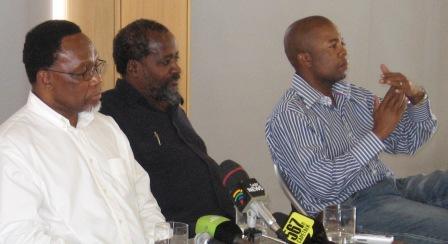ANC leaders charged with overseeing a probe into a tribunal for the media defended the initiative under interrogation by the country’s editors yesterday.
The Jacob Zuma-led ANC confirmed at December’s Polokwane conference a decision by the then Mbeki-dominated organisation last July to investigate whether the current system of press self-regulation should be replaced by a “media tribunal”.
On this basic issue, there is no divide between the two ANC camps, except that the Polokwane conference also added the adjective “statutory” to the words “media tribunal”. But the three words are anathema to editors, many of whom also believe such a system would be unconstitutional.
Debating the matter in Cape Town yesterday were ANC deputy president Kgalema Motlanthe and head of the organisation’s communications committee Pallo Jordan on the one hand, and members of the South African National Editors’ Forum (Sanef) on the other. The Sanef chair (right) is Sunday Independent editor Jovial Rantao.
Motlanthe’s emphasis was that the initiative aimed merely to “strengthen self-regulation”, and that the operative words for the investigation were “feasibility” and “desirability” of a “media appeals tribunal”. The media reaction, he said, showed hypersensitivity to criticism, and missed the point that people needed recourse when media freedom trampled rights to dignity and privacy.
Jordan proposed that the claimed hypersensitivity was a hangover from the past. In fact, the media — who dish out criticism — should be prepared to accept criticism without “arguing and squealing”. He argued that the ANC had always fought for freedom of expression, and that there was no intention to force editors to favour the party.
Reminded by Sanef veteran Raymond Louw that the apartheid government had once proposed statutory regulation of the press, Jordan responded:
“The fact that you use the same words does not mean you are up to the same tricks.”
Asked what problems the ANC had with the newspapers and the current system of self-regulation, the two party leaders made several claims (with editors responding):
Mail & Guardian editor Ferial Haffajee put it to Motlanthe and Jordan that the real reason for the proposed media tribunal was reaction to damaging coverage of both Zuma and Mbeki, and an ensuing desire to halt this kind of exposure.
They disputed this, saying that the rights of editors to critique the ANC were not in question.
On the other hand, it emerged from their remarks that sauce for the press goose is not on the agenda for the SABC gander.
Motlanthe said the new leadership had met SABC CEO (Dali Mpofu — GB) to complain about the “obvious” factional role (that is, pro-Mbeki) of the broadcaster in the build-up to the Polokwane conference.
He stated that Mpofu had accepted the criticism, and would henceforth only appoint journalists with “integrity”.
The significance of these remarks is that the ANC in effect deems the SABC to need no structural changes to curtail what the party sees as a record of factional abuse. A meeting suffices — and presumably leaves the basic apparatus unchanged and thus open to new abuse should the new incumbents decide on this form of media management.
A different standard then gets applied to the prickly print media. Here, the new ruling faction not only dialogues with the press such as at Sanef this week, but it also seems to seek structural change of major magnitude.
The tribunal is a vengeful and constraining thrust, and unbecoming to the ANC. Its investigation, put simply, is part of a drive for political control of the press.
Little wonder then that Sanef sees the initiative as an ominous threat to the essence of media freedom — probably the most serious in South Africa’s short democratic history.





